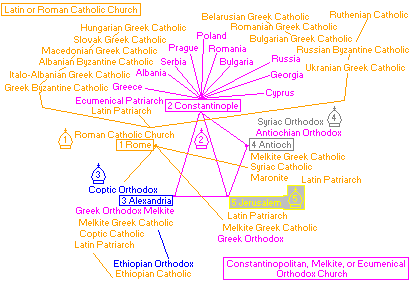and the Immaculate Conception precisely because they are untraditional You should realize that the feast of The Immaculate conception is a major event in the Eastern Orthodox Church celebrated on December 9th and is very traditional because it's completely historical according to the EO's.
The issue The EO's have is they don't believe in original sin and they did not like the scholastic terminology
Here is a good article that was posted n FR from 2003
Eastern Christianity and the Immaculate Conception
Answer by Anthony Dragani on 11-04-2003:
Dan,
Thank you for the kind words.
Concerning the Eastern Catholic understanding of the Immaculate Conception, I will offer a very brief summary of the issue. First, the theological seeds of the Immaculate Conception originated in the East, and were later spread to the West. Since the earliest centuries the Eastern Churches have celebrated "St. Anne's Conception of the Theotokos," on December 9. Only later was this feast transplanted to the West, where it is celebrated on December 8.
In the Eastern Catholic Churches we have maintained much of the theological heritage of the Eastern Church Fathers. We try to be very Patristic in our theology, and generally model our theological approach after the great Eastern Fathers. In the West theology has developed somewhat differently. Beginning in the twelfth and thirteenth centuries a whole new style of theology developed, known as Scholasticism. Scholasticism utilized a great deal of philosophical terminology from the writings of Aristotle. It essentially created a whole new way to approach theological questions, and answered them with very specific philosophical terminology. Scholasticism was the dominant theological system in the Western Church until the beginning of the 20th century.
In 1854 Pope Pius IX solemnly proclaimed the dogma of the Immaculate Conception. Being a good Western theologian, he used a great deal of scholastic terminology in the definition. Here it is, with the specifically scholastic terms emphasized by me:
"We declare, pronounce and define that the doctrine which asserts that the Blessed Virgin Mary, from the first moment of her conception, by a singular grace and privilege of almighty God, and in view of the MERITS of Jesus Christ, Saviour of the human race, was preserved free from every STAIN of original sin is a doctrine revealed by God and, for this reason, must be firmly and constantly believed by all the faithful."
There are two terms used in the definition that are completely foreign to Eastern Christian theology: "merits" and "stain." Both of these terms are of very late origin, and came to mean very specific things in the scholastic system. But to us Eastern Christians, who still use only the theological expressions of the Church Fathers, these terms are completely alien. So is this a problem, or isn't it?
I don't believe that this a problem at all. If something is written in a language that you can't understand, you simply TRANSLATE it! With some very basic knowledge of scholastic theological terminology, what Pope Pius IX is saying becomes very obvious: From the very first momemnt of her existence, Mary was miraculously preserved from all sin. We Easterns would go even a step further: she wasn't just preserved from sin, but was graced with the indwelling of the Holy Spirit.
Also, the definition speaks of Mary being "free from every stain of original sin." In the East we have always spoken of Mary's perfect holiness. The language "free from every stain of original sin" is really a somewhat negative formulation in comparison. In fact, this definition speaks of Mary as being "absent of something (the stain of sin)," while we would prefer to speak of her as being "full of something (the Holy Spirit)." In this regard I think that the Eastern approach makes a marvelous contribution to the understanding of this dogma. So does Pope John Paul II:
"In fact, the negative formulation of the Marian privilege, which resulted from the earlier controversies about original sin that arose in the West, must always be complemented by the positive expression of Mary's holiness more explicitly stressed in the Eastern tradition." (Pope John Paul II, General Audience June 12, 1996)
So, the Holy Father agrees that the Eastern understanding of the Immaculate Conception actually helps to elucidate the meaning behind the definition.
http://www.freerepublic.com/focus/f-religion/1034793/posts
The EO's have is they don't believe in original sin and they did not like the scholastic terminology That is one aspect, while you have the stronger words of the Greek Orthodox site that i posted as well as the EO's, including those who warn against Ecumenism with Rome, bemoaning "There are Orthodox who fully consider the Roman Catholics our brothers and sisters in Christ. With this disregard for the importance of theology, practice is diminished, fasting is often not observed, and the rigor of the Christian life is rarely taught, and the list goes on and on." (www.orthodox.net/articles/against-ecumenism.html)
And their RC counterparts who argue "Eastern Orthodoxy: Never The Twain Should Meet,"
Few Catholics realize that Eastern Orthodoxy, especially as represented by Palamite theology, represents a systematic and comprehensive attack upon Catholic doctrine. Catholic and Orthodox theology are not only in opposition to one another in their understanding of God (theology), but also in the various disciplines of philosophy – in Cosmology, Psychology, Epistemology, Metaphysics, Theodicy, and Ethics. They posit radically different views of God, of man, and of the relationship between God and His creation.
Finally, and very crucially, they embrace radically different views of the final destiny of man. In this respect they both employ the concept of "deification", but possess very different understandings of what this term signifies... (www.waragainstbeing.com/partiii)
And then there is the SSPX and SVs, etc.. Under sola ecclesia there are also divisions, formal and informal.

